Silvio Berlusconi obituary: Italy's flamboyant bounce-back politician
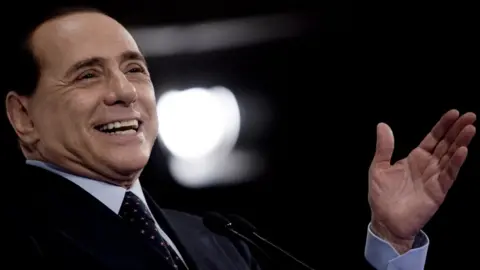 Getty Images
Getty ImagesIn the labyrinthine world of Italian politics, Silvio Berlusconi was the supreme wheeler-dealer - a man who merged business and public life like no other.
His flamboyant personality struck a chord with the Italian electorate, which continued to back him despite allegations of corruption and double-dealing.
Four times he was prime minister, and each time it seemed his political career was over, he managed to confound his critics and bounce back.
Nine years after he was banned from public office for tax fraud, he was back in parliament, elected to Italy's Senate before he turned 86 in September 2022.
But it was often his private life - his fondness for surrounding himself with beautiful young women, and the ensuing sexual scandals - that made headlines around the world.
Berlusconi, who has died at the age of 86, was a media mogul, football club owner and billionaire businessman who never gave up on politics - and helped shape Italy's image for decades.
The Milanese magnate
Silvio Berlusconi was born into a middle-class family in Milan on 29 September 1936 and grew up in a village outside the city during World War Two.
From his student days, he demonstrated the ability to make money. While studying law at university, he played double-bass in a student band - and developed a reputation as a singer, working in nightclubs and on cruise ships.
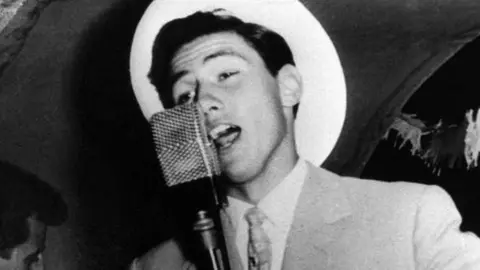 Rex Features
Rex FeaturesHis first foray into using his natural charm for business was as a vacuum cleaner salesman and in selling essays written for his fellow students.
After graduation, he started in construction with his own company, Edilnord, building an enormous apartment complex on the edge of Milan - though the source of funding for the project was something of a mystery.
In 1973, the entrepreneur launched a local cable television company called Telemilano to provide television to his properties.
Four years later, he owned two more stations and a central Milan studio. By the end of the decade, he had created a holding company, Fininvest, to manage the rapid expansion of his business holdings.
Eventually, it would own Mediaset - Italy's largest media empire and owner of the country's biggest private stations - and Italy's largest publishing house, Mondadori.
By the time of his death, he was one of Italy's richest men, with a family fortune in the billions of dollars. His children - Marina, Barbara, Pier Silvio, Eleonora and Luigi - have all taken part in the running of his business empire.
Some of that wealth would be used to indulge his personal interests - including saving his hometown football club AC Milan from bankruptcy in 1986.
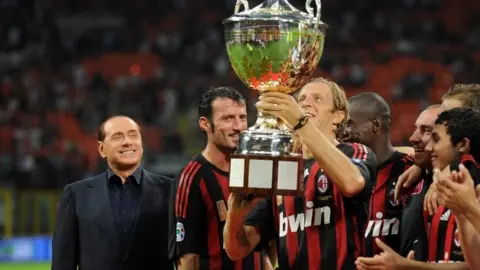 Getty Images
Getty ImagesThat investment would pay off three decades later in 2017, when he sold the club to Chinese investors for £628m (€740m).
He never gave up on football either, later buying Monza football club and enjoying its rise to the top flight of Serie A for the first time in its history.
Political power and corruption probes
Berlusconi's remarkable ability to face down the courts repeatedly - and maintain his popularity in politics - was unrivalled.
He often complained of victimisation - particularly by prosecutors in his native Milan - once claiming to have made 2,500 court appearances in 106 trials over 20 years.
Charges over the years have included embezzlement, tax fraud and false accounting, and attempting to bribe a judge. He was acquitted or had his convictions overturned on several occasions.
His controversies were highly public and formed a regular backdrop throughout his political career. It was not until February 2023 that he was finally cleared of bribing witnesses to lie about the notorious "bunga bunga" parties he had held at his villa as prime minister.
He had founded his own political party 30 years earlier in 1993 and within a year, he was catapulted to power.
Leveraging his enthusiasm for football, he named his party after a supporters' chant - Forza Italia (Go Italy). At the time, a power vacuum had emerged in the wake of a scandal affecting Italy's centre-right - and Berlusconi offered an alternative to those voters that was not leftist.
A massive advertising campaign on his own TV channels had helped propel him to victory in the 1994 election.
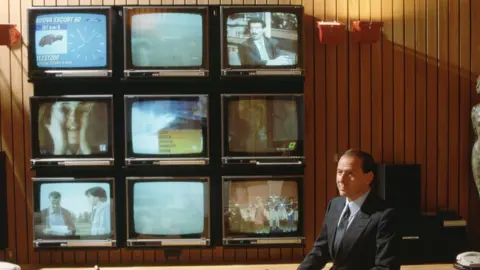 Getty Images
Getty ImagesHowever, his new appetite for politics was seen as a bid to avoid being implicated in corruption charges himself, after several of his businesses were drawn into the investigation.
But he dismissed the claims. "I don't need to go into office for the power. I have houses all over the world, stupendous boats, beautiful airplanes, a beautiful wife, a beautiful family. I am making a sacrifice."
Once he was in power, Berlusconi's government passed a law that gave him, and other top public figures, immunity from prosecution while in office, but it was later thrown out by the constitutional court.
The comeback king
Berlusconi's first coalition lasted only a few months - partly owing to friction between the different parties in it, and partly because of Berlusconi's indictment for alleged tax fraud by a Milan court.
He lost the 1996 election to the Left - but his political career was only just beginning.
In 2001, Berlusconi was back as prime minister, at the head of a new coalition known as House of Freedoms. The main plank of his election campaign was a promise to overhaul the Italian economy, simplify the tax system and raise pensions.
But Italy's finances were suffering in a worsening global economy, and Berlusconi was unable to fulfil his pledges. He lost to the Left in 2006 - but won again in 2008.
He remained a fixture in Italian politics until 2011, which would prove among his most challenging years.
Italy's borrowing costs soared during the eurozone debt crisis. The prime minister haemorrhaged support and was forced to resign after losing his parliamentary majority.
The same year, the constitutional court struck down part of the law granting him and other senior ministers temporary immunity.
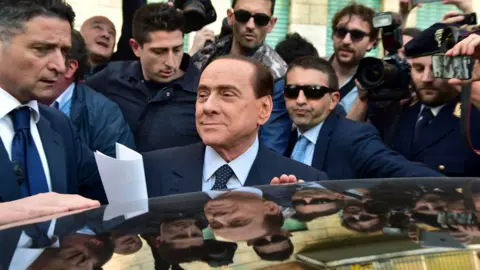 Getty Images
Getty ImagesBy the end of 2011, he was out of power. In October 2012, he was sentenced to four years' imprisonment for tax fraud and barred from public office. Berlusconi declared his innocence and spoke of a "judicial coup".
But by then, he was over 75 years of age and was handed community service instead. He worked four hours a week with elderly dementia patients at a Catholic care home near Milan.
He was also banned from public office - a prohibition which lasted for several years before his next comeback.
Bunga-bunga parties and a public private life
Beyond politics, Berlusconi made headlines for his private life, which was often very public.
The flamboyant prime minister did not hide his pursuit of younger women. His most recent partner, party colleague Marta Fascina, is more than 50 years his junior. He was known to use hair transplants and plastic surgery to make himself seem younger.
He met his second wife, Veronica Lario, after she performed topless in a play. She would go on to express frustration publicly with her husband's behaviour around young women on more than one occasion.
She filed for divorce after her husband was photographed at the 18th birthday party of model Noemi Letizia.
His most high-profile scandal was the alleged "bunga bunga" parties at his villa, attended by showgirls - a story which ended in a conviction for paying an underage prostitute for sex.
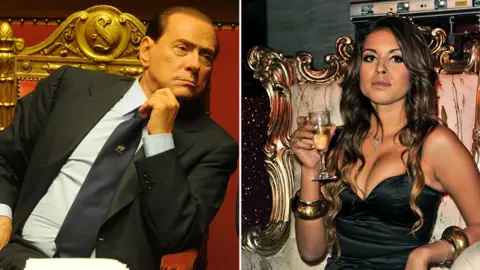 Getty Images
Getty ImagesIt eventually emerged that in 2010, Berlusconi, while prime minister, had telephoned a police station and asked for the release of 17-year-old Karima "Ruby" El Mahroug, nicknamed Ruby Heart-Stealer, who was being held for theft. She was also a reported guest of the "bunga bunga" parties.
Italian media reported that the prime minister had claimed the girl was the niece or granddaughter of the president of Egypt, and he was attempting to avoid a diplomatic incident.
Berlusconi was found guilty of paying her for sex and abusing his power in 2013 - but that ruling was overturned the following year.
For his part, Berlusconi always rejected claims he had paid any woman for sex, saying to do so was "missing the pleasure of conquest". But he also admitted he was "no saint".
Forza Italia once more
Beset by national budgetary problems and embroiled in personal scandals, Berlusconi's People of Freedom party did poorly in 2011 local elections, losing Milan, his home town and power base.
But he remained popular, coming within 1% of winning the 2013 national elections. Eventually, his party split - and Berlusconi relaunched it under its original name, Forza Italia.
Between his electoral defeats and the ban on holding public office because of his criminal conviction, it might have seemed that his political career was over.
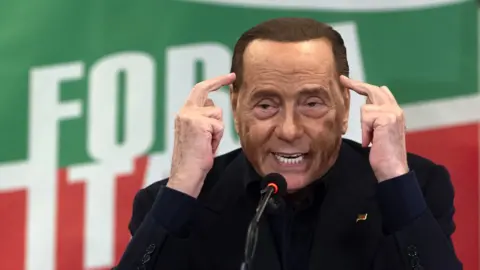 Getty Images
Getty ImagesYet Forza Italia came third in the 2018 elections with Berlusconi's name attached to its branding, behind the populist, anti-establishment Five Star and Forza Italia's own right-wing electoral partner, the League.
Berlusconi promised to "loyally support" League leader Matteo Salvini's efforts to form a government - but the League chose to rule without Forza Italia.
Once again, it seemed like Berlusconi's political career might be coming to a close. But in 2018, a court ruled that he could, once again, stand for public office - declaring him "rehabilitated".
The decision came too late for the 2018 elections, but in 2019 the eternal vote-winner announced he was running for the European Parliament. As the top candidate on his party's lists, he easily won himself a European seat.
Three years later, he was back in Italy's parliament and his Forza Italia a junior party in Giorgia Meloni's right-wing coalition.
A notorious icon
With his slicked-back dark hair and raunchy scandals, Berlusconi was instantly recognisable and cultivated a larger-than-life personality.
He also became notorious for his questionable sense of humour after a number of high-profile gaffes. On one occasion, he suggested a German MEP would have made a good concentration camp guard - and on another, claimed Mussolini was actually a benign leader.
He dismissed these statements as jokes. However, he was also a long-time friend of Vladimir Putin and blamed Ukraine for Russia's invasion when his own government was strongly behind Kyiv.
It is probably his involvement in almost every aspect of Italian life that angered his critics most - particularly his media empire, which, many say, gave him an unfair advantage at elections.
The many Italians who voted for him felt his success as a business tycoon was evidence of his capabilities, a reason why he should run the country.
Berlusconi himself dismissed claims that mixing business and politics had been more beneficial to him personally than to Italy as a whole.
"If in taking care of everyone's interests, I also take care of my own, you can't talk about a conflict of interest," he declared.
